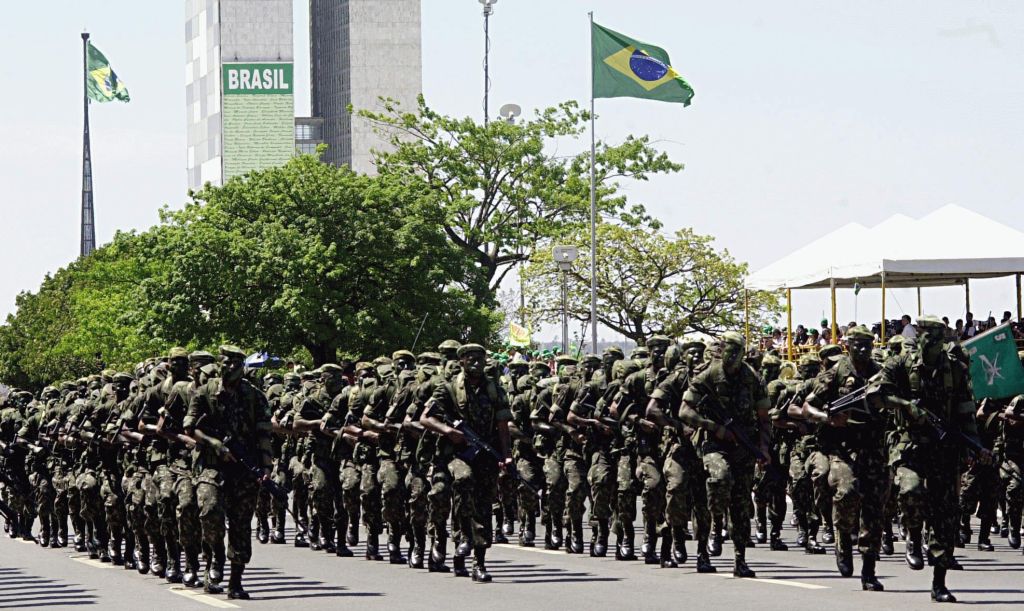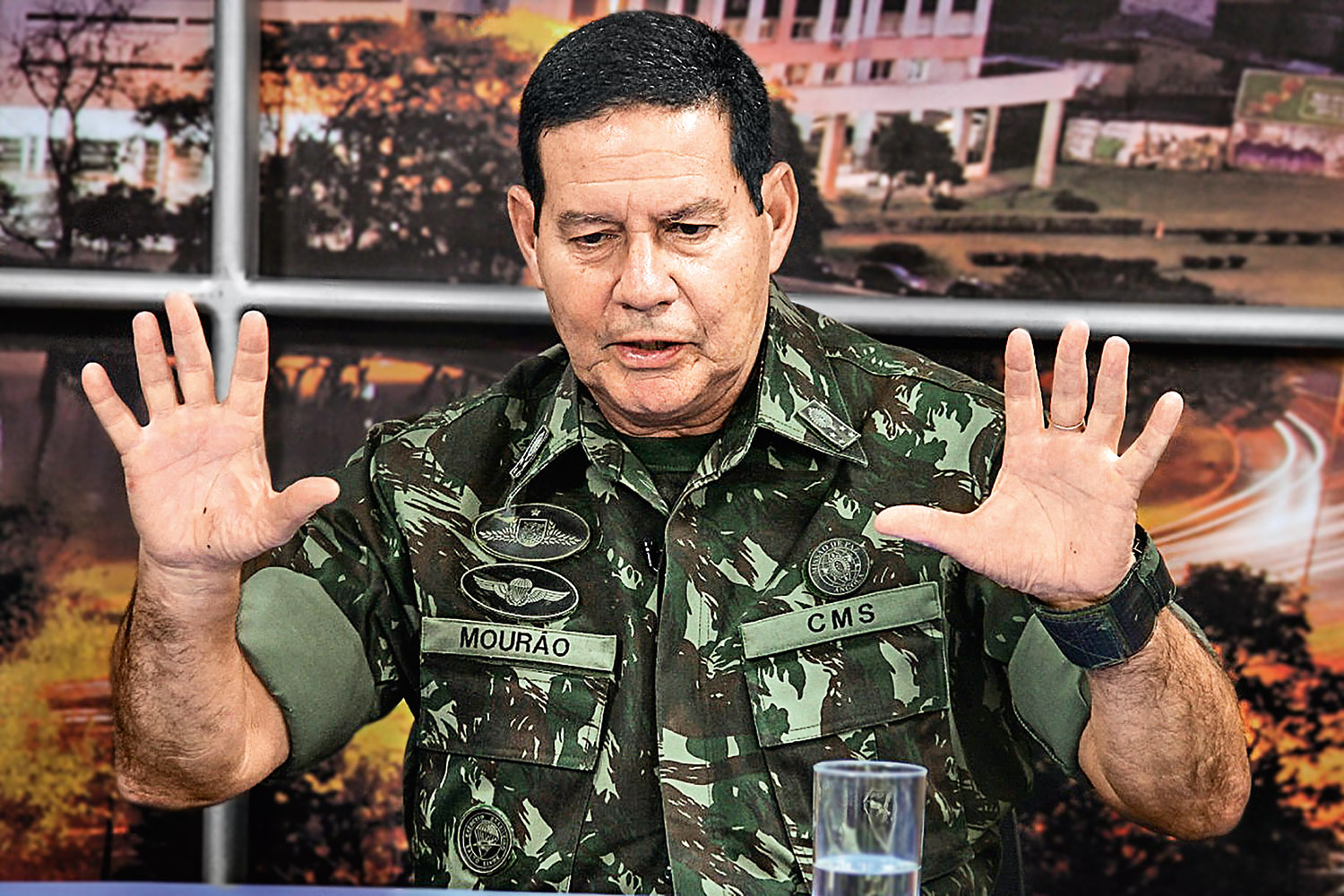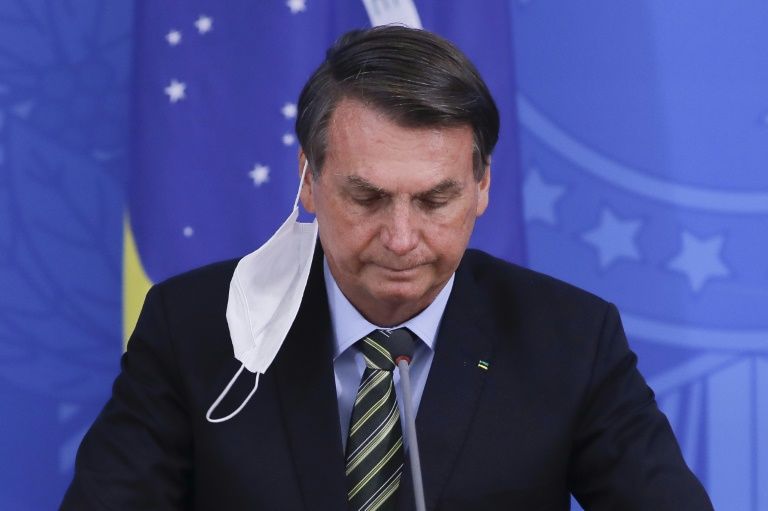RIO DE JANEIRO, BRAZIL – The Armed Forces High Command has raised a red flag in recent days as a result of President Jair Bolsonaro’s highly controversial reactions to the novel coronavirus crisis.
This week, representatives of the Air Force, Army and Navy signaled to the hitherto not-so-well-liked vice-president, General Hamilton Mourão, that he could count on their support should the occupant of the Planalto Palace leave office through impeachment or resignation.

Despite the fact that the debate has intensified since the health crisis worsened, the chances of Bolsonaro leaving the presidency are very remote. On more than one occasion he has indirectly stated that he would not leave office.
“I will never leave the Brazilian people, to whom I owe absolute loyalty!”, he said on Twitter. Chamber of Deputies president Rodrigo Maia, who would be responsible for starting a motion for impeachment, declared this week that the issue is not on Congress’ agenda for the time being.
Nevertheless, the military has been holding meetings in Brasília, including with Bolsonaro’s allies and senior civilian members. At least two meetings took place during the week. They discussed theoretical scenarios for the medium and long term.
Two participants in these meetings reported that the group is concerned about a potential sudden increase in sicknesses and deaths caused by the Covid-19 disease, that could be linked to Bolsonaro’s denialist rhetoric about the severity of the disease.
They emphasized that when the President suggests ending the quarantines and social isolation decreed by governors and mayors, it may sound callous.
In this scenario, they argue that the President’s popularity could plummet, as he could be tarred with the brush of being a failed leader who preferred to leverage the economy rather than save lives.
“This is a speech that we are fighting against. But whoever is on the front line of war is a soldier who knows he can die. In a pandemic, we cannot put everyone in the same situation as soldiers,” one of the group’s members said in a not-for-attribution remark.
On Tuesday, the Army commander, General Edson Leal Pujol, arranged to exempt the forces from any responsibility over the crisis. Contrary to what the President advocated, he declared that the military should be concerned about the Covid-19 and said that fighting the spread of the disease “is perhaps the most significant mission for our generation”.
The theory that the President could make an extreme move and declare a state of siege or defense -with a number of restrictions on freedom, communication and the suspension of constitutional guarantees -has been rumored in Brasília; however, these measures would require the approval of the National Congress, where Bolsonaro does not have a majority.
These are radical actions, but they could be used politically, based on the discourse Bolsonaro has directed at his support base, that he tries to “save Brazil,” but the old policy does not help him.
Officially, the president denies that he will decree a state of siege or defense on the grounds that it would cause a sense of panic in the country. “I think we would be pushing forward, sending a message of panic to the population,” he said at a media conference last week.

However, he sends messages between the lines. This Friday, in an interview with journalist José Luiz Datena, from TV Band, he was asked if he intended to stage a coup and close the country. The answer: “Anyone who really wants to stage a coup will never say he wants to do it”.
Mainly due to these indications, the military have drawn closer to the vice-president. Among the uniformed leaders, Mourão himself is far from being a unanimous choice. In the military milieu, he started to be viewed as a radical when, in 2015, he suggested that the Armed Forces could intervene.
At the time, Workers’ Party President Dilma Rousseff was in crisis and Lava Jato was beginning to uncover serial corruption scandals. In the political field, Mourão was only Bolsonaro’s fifth option to join his ticket. He was chosen at the last minute, given the refusal by other politicians, their parties or due to the President’s own distrust.
Mourão is not well regarded among the Bolsonaro family. His main enemy inside the clan is the Rio de Janeiro city councilor, Carlos Bolsonaro. Early in his administration, Mourão began to welcome foreign ambassadors to show that Brazil would not be closed to the world.
He was also the main articulator of the rapprochement with China, Brazil’s main commercial partner. From then on, he began to be viewed as a moderate voice in an extremist government. Within the government’s ideological true believers, the rapprochement with China was perceived as a betrayal of the President, who wanted to distance himself from communists.
In practice, the ideology was set aside and trade between the two nations has been maintained at full steam.
Mourão has acted in a few key moments, as in the Venezuelan crisis, when there were discussions as to whether or not Brazil would endorse a military intervention to support Juan Guaidó in the clash with President Nicolas Maduro; more recently, Mourão has begun to coordinate the Amazon Council, a body re-created in the wake of the forest fire crisis.
This week, the vice president emerged from the shadows once again, when he opposed his boss and said that he had been misinterpreted in a statement to the nation that the country should prioritize the economy.
“It may be that he (Bolsonaro) expressed himself in a way, let’s say, that was not the best, but what he sought to address is the concern we all have with this second wave, as it is called, in this coronavirus issue”.
Bolsonaro reacted on Friday. In the interview with Band, he said that Mourão felt free to comment because he was “undismissable”. “With all due respect to Mourão, he’s a lot more crude than me. Not because he’s from Rio Grande do Sul. Some say I’m even very cordial around Mourão. He is the only one who is not dismissable in the government, so he can be at ease”.
In this context, Bolsonaro’s bet on challenging governors and isolating himself politically has meant that he has had to listen to pot-banging protests against his government in the country’s main cities for ten consecutive days . This week, he also lost the support of his very first political ally, Goias’ governor Ronaldo Caiado.

But the political chess board is far from being clear. After pressure from the President, three governors authorized the partial opening of commerce in their states: Rondônia, Santa Catarina and Mato Grosso.
The first two governors, Marcos Rocha and Carlos Moisés are affiliated to the PSL (Social Liberal Party), the President’s former party and were elected in the 2018 conservative wave of elections. Mauro Mendes (DEM), on the other hand, is a pioneer in the agricultural sector, a driving force of the local economy.
The next movements will still be more dependent on health issues than on the speeches of one side or the other.
Source: El Pais

